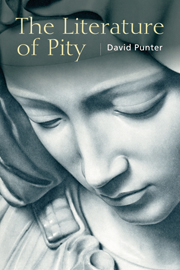Book contents
- Frontmatter
- Contents
- Plates
- Preface
- Acknowledgements
- 1 Distinguishing Pity
- 2 Pity and Terror: The Aristotelian Framework
- 3 Pietà
- 4 Shakespeare on Pity
- 5 The Eighteenth Century
- 6 Blake: ‘Pity would be no more …’
- 7 Aspects of Victoriana
- 8 Chekhov and Brecht: Pity and Self-Pity
- 9 ‘War, and the pity of War’: Wilfred Owen, David Jones, Primo Levi
- 10 Reflections on Algernon Blackwood's Gothic
- 11 Pity's Cold Extremities: Jean Rhys and Stevie Smith
- 12 Reclaiming the Savage Night
- 13 ‘Pity the Poor Immigrant’: Pity, Diaspora, the Colony
- 14 Lyric and Pity
- After Thought: Under the Dome
- Notes
- Bibliography
- Index
2 - Pity and Terror: The Aristotelian Framework
Published online by Cambridge University Press: 05 September 2014
- Frontmatter
- Contents
- Plates
- Preface
- Acknowledgements
- 1 Distinguishing Pity
- 2 Pity and Terror: The Aristotelian Framework
- 3 Pietà
- 4 Shakespeare on Pity
- 5 The Eighteenth Century
- 6 Blake: ‘Pity would be no more …’
- 7 Aspects of Victoriana
- 8 Chekhov and Brecht: Pity and Self-Pity
- 9 ‘War, and the pity of War’: Wilfred Owen, David Jones, Primo Levi
- 10 Reflections on Algernon Blackwood's Gothic
- 11 Pity's Cold Extremities: Jean Rhys and Stevie Smith
- 12 Reclaiming the Savage Night
- 13 ‘Pity the Poor Immigrant’: Pity, Diaspora, the Colony
- 14 Lyric and Pity
- After Thought: Under the Dome
- Notes
- Bibliography
- Index
Summary
In the world of western culture, it is impossible to try to trace or unravel the course of pity without seeking an origin, and that origin has usually been found in Aristotle's Poetics (c. 335 BC), where Aristotle appears to attempt to account for the force of various kinds of drama, and particularly, for our purposes, for the force of tragedy. There are, of course, many other descriptions of drama and its genres, and many other accounts of tragedy: Raymond Williams's work on ‘modern tragedy’ comes to mind, although the title is interesting and indicative, suggesting as it does that tragedy is intrinsically something ancient, something which we can ‘repeat with difference’, but with roots laid down in the antique.
Williams himself would naturally have shied away from the idea that this means that there is something ‘universal’ about tragedy: there are no doubt specific versions of tragedy, or better, specific events, feelings, regimes of emotion and behaviour to which we might from time to time supply the appellation ‘tragedy’. Nevertheless, when we consider the term ‘tragedy’, it is possible that we feel ourselves, however misguidedly, to be within some kind of cultural storehouse – and within that storehouse, whose proprietor is Aristotle, we immediately find ourselves in the presence of the two key terms Aristotle proposes when considering the force of tragedy: pity and terror.
- Type
- Chapter
- Information
- The Literature of Pity , pp. 12 - 23Publisher: Edinburgh University PressPrint publication year: 2014



